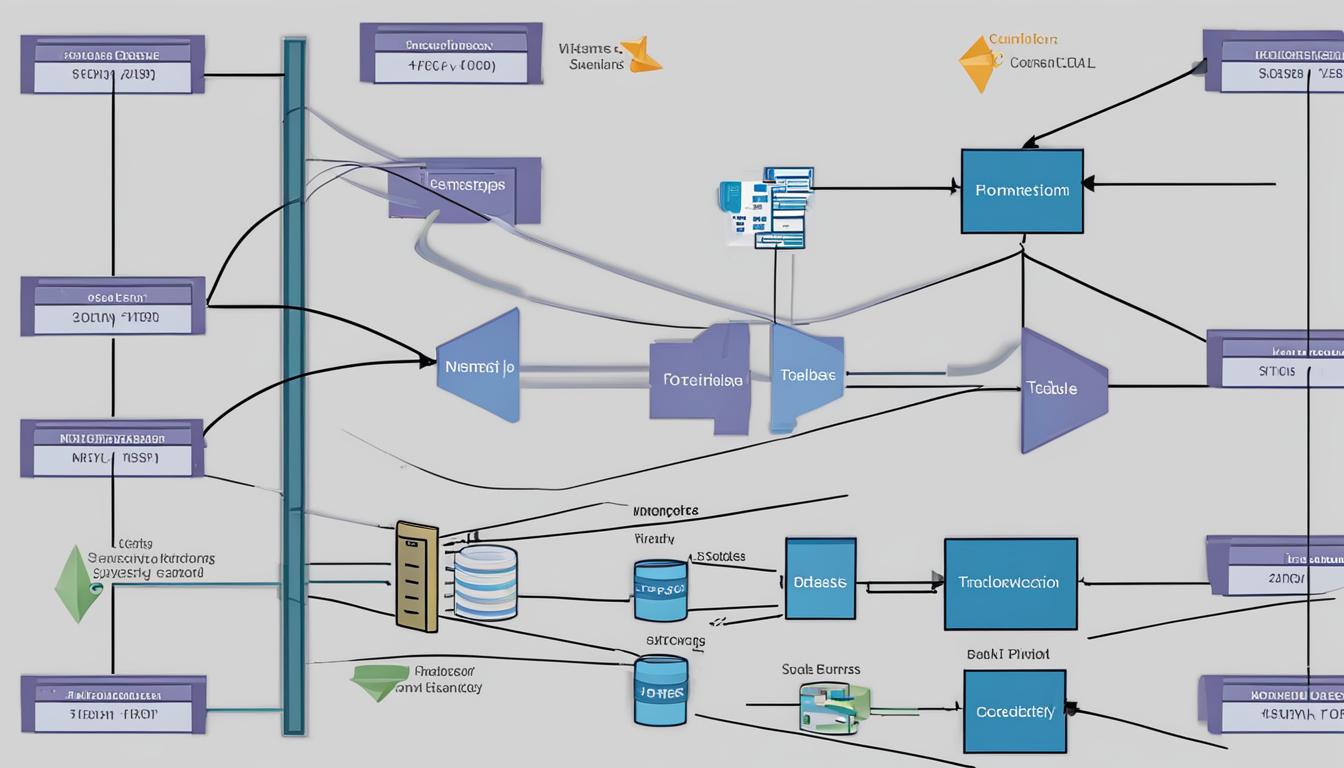Understanding Foreign Keys in Databases Explained
What is a Foreign Key in a Database? In databases, a foreign key is a column or columns that establish a relationship between two tables by linking to a column in a different table. This relationship ensures data integrity, as it only allows values to be added or updated if they already exist in the referenced column. Foreign keys play a vital role in defining relationships between tables and maintaining referential integrity.
Foreign keys are not mandatory and can be used based on the specific data and relationships in the database. However, they offer several benefits in relational databases, such as preventing data duplication, ensuring efficient data storage, and enforcing consistency and accuracy. By referencing values from other tables, foreign keys promote efficiency and reduce redundancy in the database structure.
Key Takeaways:
- A foreign key in a database links a column or columns in one table to a column in another table.
- Foreign keys ensure data integrity by only allowing values that exist in the referenced column.
- They help define relationships between tables and maintain referential integrity.
- Foreign keys are not mandatory and can be used based on specific data and relationships in the database.
- Using foreign keys reduces data duplication, promotes efficiency, and improves database structure and consistency.
How Foreign Keys Work
To understand how foreign keys work, it’s important to grasp their role in establishing relationships between tables in a database. A foreign key links a column in one table, known as the child table, to a column in another table, referred to as the parent table. This link is typically created between the primary key column in the parent table and a column in the child table.
When a foreign key constraint is applied to a column in the child table, it ensures that any value added or updated in that column must match an existing value in the referenced column of the parent table. In other words, the child table can only contain values that are present in the parent table. This constraint helps maintain the integrity of the relationships between tables and prevents the introduction of erroneous or inconsistent data.
Foreign keys play a crucial role in maintaining database relationships and enforcing data consistency. By linking tables, they facilitate the retrieval and manipulation of data based on these relationships, resulting in more efficient and accurate operations.
Let’s take a closer look at an example to illustrate this concept:
I have a database with two tables: Customers and Orders. The Customers table has a primary key column named CustomerID, which uniquely identifies each customer. The Orders table contains a foreign key column named CustomerID as well, referencing the CustomerID column in the Customers table.
Whenever a new order is added to the Orders table, the foreign key constraint ensures that the value entered in the CustomerID column matches an existing CustomerID in the Customers table. This constraint helps maintain the relationship between customers and their orders, preventing the insertion of invalid customer IDs.
In addition to maintaining relationships, foreign keys also contribute to the overall performance of a database. When foreign keys are indexed, operations that involve linked tables can leverage these indexes to optimize query execution and improve efficiency.
Advantages of using foreign keys in the database:
- Ensure data integrity by enforcing valid relationships between tables.
- Prevent the insertion of inconsistent or invalid data.
- Simplify query operations by providing a structured and organized database.
- Improve performance through the use of indexed foreign keys for faster data retrieval.
Foreign keys are a fundamental aspect of database design and play a central role in maintaining the integrity and relationships of data. By establishing connections between tables and enforcing referential integrity, foreign keys help create a robust and reliable database structure.
Benefits of Using Foreign Keys
Foreign keys offer several benefits in relational databases. They provide a powerful mechanism for referencing tables in a database, allowing developers to establish relationships between tables and maintain data integrity.
Promoting Efficiency and Reducing Data Duplication
By referencing values from other tables, foreign keys enable developers to avoid storing redundant data. Instead of duplicating information in multiple tables, foreign keys allow for the efficient organization of data. This promotes a more streamlined database structure and reduces the chances of data inconsistency or discrepancies.
Ensuring Data Integrity
Database integrity constraints are crucial for maintaining the accuracy and consistency of data. Foreign keys play a significant role in these integrity constraints by ensuring that only valid and consistent data is added to the referencing table.
When a foreign key is set, the database checks if the referenced value exists in the parent table. If the value does not exist, the database prevents the insertion or update of data, thereby preserving data integrity. This enforcement helps eliminate the risk of having invalid or incorrect information in the database.
Establishing and Enforcing Relationships
Foreign keys help establish and enforce relationships within the data. By linking tables, they define dependencies and maintain the integrity of these relationships. This means that the database will not allow the creation of relationships to non-existent or deleted data, preventing data inconsistencies.
Improving Database Structure and Consistency
Integrating foreign keys into the database design enhances the overall structure and consistency of the data. It encourages a relational approach, where tables are interconnected, and the relationships between them are clearly defined. This promotes a more organized and logical database structure, making it easier to retrieve and manipulate data.
Enhancing Accuracy and Reliability
By enforcing data integrity and maintaining relationships, foreign keys contribute to the accuracy and reliability of a database. They help ensure that the data stored reflects the true representation of the real-world entities and their relationships. This is particularly important when handling critical data or performing complex operations that involve multiple tables.
Overall, foreign keys are a valuable tool in database design and maintenance. They not only improve data organization and efficiency but also play a crucial role in maintaining data integrity and establishing meaningful relationships. By leveraging the benefits of foreign keys, developers can create robust and reliable databases that are optimized for performance and accuracy.
| Advantages of Using Foreign Keys |
|---|
| Promotes efficiency by reducing data duplication |
| Ensures data integrity by only allowing valid and consistent data |
| Establishes and enforces relationships within the data |
| Improves database structure and consistency |
| Enhances data accuracy and reliability |
How to Use Foreign Keys in the Real World
In practice, using foreign keys in databases is implemented using SQL syntax. When creating a table, the FOREIGN KEY constraint is used to establish the relationship between two tables. This constraint ensures that the values in a foreign key column exist in the referenced column of the parent table, typically the primary key.
Let’s take a look at an example:
| Customers | Orders |
|---|---|
|
|
In this example, the CustomerID column in the Orders table references the CustomerID column in the Customers table. This ensures that each order is associated with a valid customer. If a value is added to the CustomerID column in the Orders table that does not exist in the Customers table, it will be rejected due to the foreign key constraint.
Different databases may have slightly different syntax for creating foreign keys, but the concept remains the same. The use of foreign keys allows developers to create meaningful relationships between tables and enforce data integrity. By ensuring that only valid and existing values are stored in the child table, foreign keys contribute to the overall accuracy and reliability of the database.
Whether it’s maintaining customer order data or connecting various entities within a database, practical application of foreign keys is essential for organizing and protecting your data.

Benefits of Using Foreign Keys:
Foreign keys create relationships between tables and enforce data integrity.
They prevent the addition of invalid or inconsistent data, ensuring data consistency.
Foreign keys reduce data duplication and promote efficiency by referencing values from other tables.
Types of Constraints in Relational Databases
In addition to foreign key constraints, relational databases utilize various other types of constraints to enforce rules and regulations on the data. These constraints play a crucial role in defining the structure and integrity of the database. Let’s explore some of the common types of constraints:
Check Constraints
Check constraints limit the values that can be accepted by specific columns. They allow you to specify conditions that must be satisfied for a value to be inserted or updated in a column. For example, you can use a check constraint to ensure that a column only accepts positive numbers or specific strings.
Default Constraints
Default constraints provide default values for columns. When a new record is inserted into a table and no value is explicitly provided for a column with a default constraint, the default value defined for that column will be used instead. This helps to ensure consistency and eliminates the need to provide values for all columns in every insert statement.
Unique Constraints
Unique constraints ensure that no duplicate values are entered in specific columns. Each record in the column with a unique constraint must have a distinct value, preventing the database from accepting duplicates. Unique constraints are often used to enforce data integrity rules and maintain the uniqueness of key fields in tables.
Not Null Constraints
Not null constraints enforce that a column must always contain a value. This means that a column cannot be left empty or null. By setting a not null constraint, you can ensure that essential data is always present in specific columns, avoiding inconsistencies or errors in your database.
Primary Key Constraints
Primary key constraints uniquely identify each row in a table. They ensure that every record in the table has a unique value in the primary key column(s). Primary keys are used to establish relationships between tables and serve as the basis for foreign key references. They are crucial for maintaining data integrity and providing efficient access to data.
These constraints, including foreign key constraints, work together to define the structure and integrity of a relational database, ensuring data consistency and accuracy.
| Constraint Type | Description |
|---|---|
| Check Constraints | Limit accepted values by specifying conditions. |
| Default Constraints | Provide default values for columns. |
| Unique Constraints | Ensure no duplicate values in specific columns. |
| Not Null Constraints | Enforce that a column must always have a value. |
| Primary Key Constraints | Uniquely identify each row in a table. |
Conclusion
Foreign keys are an essential component of databases, particularly relational databases. They play a critical role in maintaining data integrity, establishing relationships between tables, and ensuring the consistency and accuracy of the data. By linking tables and enforcing referential integrity, foreign keys help create a structured database that is efficient, secure, and reliable.
Relational databases rely on the concept of foreign keys to establish robust relationships between tables. These relationships contribute to a well-defined database structure, allowing for seamless data retrieval and manipulation. The use of foreign keys enhances the efficiency and performance of database operations, making them an invaluable tool for database administrators and developers.
Ensuring data integrity is crucial in any database system. The implementation of foreign keys provides a mechanism to maintain the consistency and validity of the data. By enforcing referential integrity, foreign keys prevent the insertion of inconsistent or erroneous data, promoting data reliability and accuracy.
In conclusion, understanding and effectively implementing foreign keys is essential for database administrators and developers to design and maintain robust relational databases. By utilizing foreign keys, they can establish meaningful relationships between tables, maintain data integrity, and ensure the overall quality of the database structure.
FAQ
What is a foreign key in a database?
A foreign key is a column or columns in a database that is linked to a column in a different table. It establishes a relationship between two tables and ensures data integrity by only allowing values to be added or updated if they already exist in the referenced column.
How do foreign keys work in databases?
Foreign keys work by linking a column in one table (child table) to a column in another table (parent table) that contains unique values, often the primary key. The foreign key constraint ensures that a value can only be added or updated in the child table if it matches an existing value in the parent table.
What are the benefits of using foreign keys in databases?
Foreign keys offer several benefits in relational databases. They allow developers to avoid storing redundant data by referencing values from other tables. This promotes efficiency and reduces data duplication. Foreign keys also contribute to data integrity by ensuring that only valid and consistent data is added to the referencing table.
How can foreign keys be used in real-world scenarios?
Foreign keys are implemented using SQL syntax when creating a table. The FOREIGN KEY constraint is used to establish the foreign key relationship between two tables. The foreign key column in the child table references the primary key column in the parent table. This ensures that the values in the foreign key column exist in the referenced column of the parent table.
What are the types of constraints in relational databases?
In addition to foreign key constraints, other types of constraints used in relational databases include check constraints, default constraints, unique constraints, not null constraints, and primary key constraints. These constraints work together to define the structure and integrity of a database.
What is the importance of foreign keys in databases?
Foreign keys are an essential component of databases, particularly relational databases. They play a critical role in maintaining data integrity, establishing relationships between tables, and ensuring the consistency and accuracy of the data.
- About the Author
- Latest Posts
Mark is a senior content editor at Text-Center.com and has more than 20 years of experience with linux and windows operating systems. He also writes for Biteno.com






